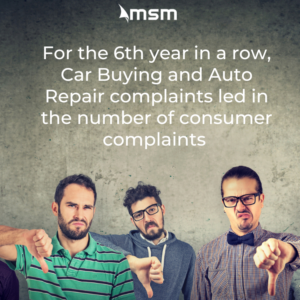Last year, state, local, and federal agencies received countless consumer complaints. Topping the category for complaints was the category of auto sales and repairs, as per the Consumer Federation of America. The complaint categories included industries that are notorious for consumer complaints, such as landlord-tenant, home improvement, and retail purchase issues. Still, issues regarding the sale of new and used automobiles, as well as problems related to repairs, irk countless potential customers.
 When looking in the rearview mirror at the past, the first carmaker to sell through a franchised dealer was Winton in Cleveland in 1897. The 1901 Oldsmobile Curved Dash was the first mass-produced car, followed by perhaps the most successful car model of all time, the Model T, which was produced on an assembly line in 1913. Later in the decade, General Motors was one of the first establishments to open a financing branch to cover dealers for inventory. By 1955, a U.S. government committee was formed to investigate consumers’ complaints of dealers forcing cars on them, and opening too many franchises in certain areas.
When looking in the rearview mirror at the past, the first carmaker to sell through a franchised dealer was Winton in Cleveland in 1897. The 1901 Oldsmobile Curved Dash was the first mass-produced car, followed by perhaps the most successful car model of all time, the Model T, which was produced on an assembly line in 1913. Later in the decade, General Motors was one of the first establishments to open a financing branch to cover dealers for inventory. By 1955, a U.S. government committee was formed to investigate consumers’ complaints of dealers forcing cars on them, and opening too many franchises in certain areas.
By 1958, the Automobile Information Disclosure Act was created, investigating unhanded tactics, overcharging, financing kickbacks, and false trade-in values. Nearly a century later, numerous complaints have still dogged auto dealerships.
1. Lack of Transparency
Whether this reputation is true or false really doesn’t matter. For generations, distrust has been built into the minds of customers. Some of this was warranted (unscrupulous dealers and unchecked business practices), while others were not (easy targets for when vehicles inevitably broke down).
Transparency of business practices is a vital part of building trust with consumers. A solution to this is staying in contact with the customer. For example, if there’s something wrong with the car, don’t try and hide the bad news. Transparency is appreciated over beating around the bush. This establishes trust — a rarity in the mind of the consumer.
2. Poor Customer Service
It’s no secret: service advisors dole out preferential treatment at the dealership. So when customers line up, a salesperson often gravitates toward those that have nice-looking cars or appear to be wealthy.
Essentially, they are compelled by superficial observations.
If you don’t meet preconceived criteria, interactions could transpire at a sluggish pace. People hate coming to the dealership and waiting around. Most of the time, making an appointment, or dropping off a vehicle needing service and getting a lift is advisable to sit around the lobby.
3. Up Pricing
Currently, many drivers are paying well over MSRP for their vehicles. Because automakers can’t directly sell to their drivers, customers are at the mercy of dealerships. Service jobs are also priced according to a “flat rate” book, which determines the time it takes for repairs and services. Mechanics try to beat this time, making more money for less work. The mechanic incentivizes speed and overselling. If the car needs service, vehicle owners are weary of the smaller operations — these don’t cost the dealership much but make a very high percentage of profit.
4. Pushing Repairs That Aren’t Necessary
How often has a technician claimed the brake pads were at a certain percentage of excessive wear, knowing full well service wouldn’t be needed? Or insist on turning the rotors when it wasn’t called for? People are weary of devious dealership service departments and mechanics that push tactics to get extra work.
5. Beware the Dreaded “As Is.”
If a driver sees a questionable price tag, hearing the dreaded “as is” words is a no-go. Although some states have more stringent state inspection standards, others can do just enough repairs to pass the test.
These vehicles have no guarantees.
Some shops won’t even let outside mechanics examine these cars to see if they truly pass a reasonable test.
6. Tampered Mileage
There’s (often unfounded) suspicion that odometers have been rolled back. Recently, 17 Georgia consumers were able to revoke the transaction or receive compensation for the reduced value of their vehicle; the state found the mileage had actually been tampered with.
7. Yo-yo Pricing
First, let’s define what exactly “yo-yo” financing is. Buyers see a sales contract with terms too good to be true.
Most of the time, they are just that.
After the car is taken home, days later, a dealer can report an issue with finance and can use predatory or deceptive behavior to get the buyer to return and renegotiate the deal. If this fails, the dealer threatens to repossess the car. Often, consumers won’t understand they can simply return the vehicle.
8. Blind Negotiating
Mostly, consumers will avoid directly dealing with the dealership when it comes to financing. Instead, thet can get a preapproved car loan from a bank or credit union before parking on the car lot. The Consumer Financial Protection Bureau also recommends reviewing the sales contract, making sure to get copies of bills signed, and verifying the loan rate is final before taking the car off the lot.
9. Pushy
Car buying and selling is already an extremely competitive business. Because of supply chain issues affecting recent economic trends, these salespeople can be even worse. Interest rates, tariffs, and energy concerns have decreased sales, especially with newer vehicles.
10. Advertising
False and misleading ads are a frequent complaint by buyers. If it’s too good to be true, it probably is. The entire goal of these commercials is to lure individuals into a showroom. Exaggerated claims usually involve low prices, zero percent financing, and low monthly payments. The result is an unhappy prospective buyer, and the time wasted by the sales team that won’t be able to make a sale because the buyer came into the dealership only for the specific unavailable offering.
What This Means for Auto Dealerships
Unless you’re dealing with a first-time car buyer, any potential buyer who comes into your car dealership or reaches out via telephone or online has almost assuredly had a bad experience at a dealership involving at least one of the abovementioned issues. Let’s face it, overcoming auto dealerships, and car salespeople stereotypes are always one of the bigger challenges auto dealers face. Dealerships can’t pretend that buyers don’t have these preconceived notions based on past experiences. Instead, auto dealers need to use this knowledge to drive better relationships with buyers.
Knowing the past experiences, your buyers likely had at other dealerships can help create a culture and business processes that ensure your dealership avoids any of the above complaints. Even more, be the antidote. The buyers’ experience is more important than ever. The best price, or quickest service, doesn’t guarantee a sale. But, if you provide a buying experience that avoids any of the above complaints, you’ll get great reviews, gain customers for life and increase profit.







